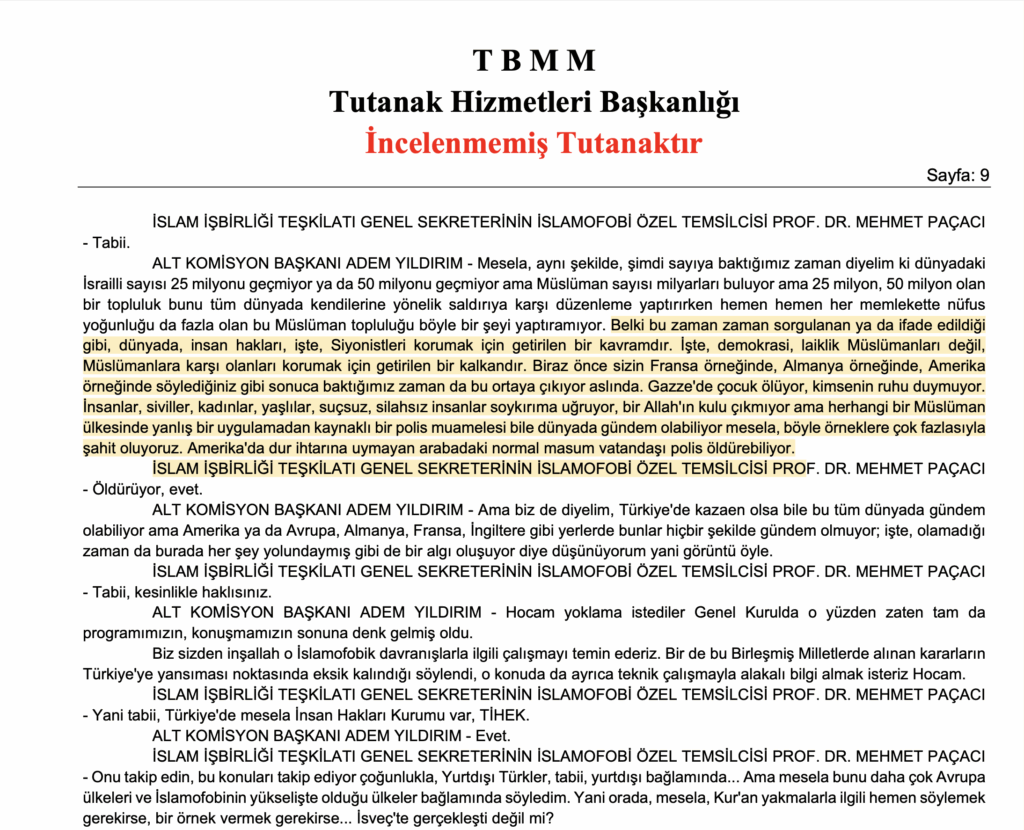Levent Kenez/Stockholm
During a November 20 session of the Turkish Parliament’s Human Rights Investigation Committee, the lawmaker presiding over the meeting asserted that global human rights frameworks were created to protect Zionists, a statement that drew immediate attention for its issuance within an institution dedicated to safeguarding human rights principles. Adem Yıldırım, a lawyer and ruling party member of parliament, delivered the remarks while addressing what he described as unequal global responses to violence against Muslims.
Yıldırım made the comments as the Subcommittee on Islamophobia and Racism convened to hear a presentation from Mehmet Paçacı, the Organization of Islamic Cooperation’s special envoy on Islamophobia. The meeting was part of the subcommittee’s ongoing review of discrimination and hate-motivated violence targeting Muslim communities abroad.
Speaking to the lawmakers Yıldırım said he believed Muslim populations around the world lacked the political influence demonstrated by much smaller communities. He argued that this imbalance allowed some groups to shape international norms while leaving Muslims without comparable protections. “If we look at the numbers, the Israeli population in the world does not exceed 25 or 50 million. The Muslim population reaches into the billions,” he said. “Yet a community of 25 million or 50 million secures regulations everywhere to protect themselves from attacks, while this Muslim community, with a high population density in nearly every country, cannot make states adopt such measures.”

Yıldırım then expanded the claim into a broader critique of international human rights mechanisms. He said some people questioned whether global legal frameworks were created for the benefit of one group. “As is sometimes expressed, human rights is a concept used to protect Zionists in the world,” he said. He followed this by contending that democratic and secular principles were interpreted in ways that did not shield Muslims from discrimination but instead favored those he characterized as hostile to Muslims.
The remarks were not challenged during the meeting and were allowed to stand as part of the official record. Their appearance within a committee tasked with monitoring human rights compliance added an immediate layer of irony to the event. The Human Rights Investigations Committee addresses cases involving hate speech, discrimination and abuses of due process, and its subcommittees are presented as mechanisms for documenting and confronting rights violations at home and abroad.
Yıldırım’s comments came amid a discussion of global conflicts and differing international reactions to civilian casualties. Referencing the Israel Gaza war, he said the death of children and other noncombatants in Gaza received what he characterized as insufficient global attention. “Children are dying in Gaza, and no one hears it,” he said. “People — civilians, women, the elderly, innocent and unarmed individuals — are experiencing a genocide, and not a single person speaks up.”
By contrast, he argued that when misconduct occurred in Muslim-majority countries, international observers reacted strongly. He cited incidents involving police actions in Western states and alleged that similar events in Muslim countries triggered disproportionate global scrutiny. “In any Muslim country, even police mistreatment stemming from an incorrect practice becomes part of the worldwide agenda,” he said. He contrasted this by referring to cases in the United States in which police shot drivers who failed to comply with commands to stop and claimed those events generated less international reaction. Paçacı responded only briefly, saying, “Yes, they do,” before Yıldırım continued his comments.
Paçacı later delivered a detailed briefing on rising anti-Muslim sentiment in Europe and North America. He reported that incidents categorized as Islamophobic increased by 43 percent in Europe during 2024 according to figures released by various monitoring bodies. He described cases involving attacks on mosques, acts of vandalism using pig heads or pig’s blood and rising levels of discrimination against Muslim women wearing headscarves. His presentation included a reference to employment discrimination, unequal treatment in housing markets and what he described as large-scale underreporting by victims who feared social or legal repercussions.
The subcommittee’s meeting was part of a broader series of hearings aimed at compiling a national report on Islamophobia. Paçacı told lawmakers that most documented incidents represented only a fraction of actual cases and that many Muslims refrained from filing complaints. He said diaspora communities faced significant psychological pressure, including fear of being labeled as outsiders even when they held citizenship.
Records related to Yıldırım’s career show that his comments did not come as a surprise to critics who have followed his rise in Turkish politics. Before entering parliament, Yıldırım served as deputy chair of the pro-government Lawyers Association (Hukukçular Derneği), which represented complainants in trials linked to a coup attempt on July 15, 2016.

The failed putsch prompted widespread arrests and purges across state institutions, a process critics say resulted in severe and irreversible human rights violations.
Opponents of President Recep Tayyip Erdogan have long argued that the government used the coup attempt to remove political adversaries from the military and other state bodies. Many believe it was a false flag operation orchestrated by Turkish Intelligence. Yıldırım’s role in propagandizing the official narrative during the related trials also drew significant attention at the time.
Opponents also accused Yıldırım’s Lawyers Association along other organizations funded by the government of pushing for convictions in cases in which numerous military personnel and military academy students who had not participated in the coup attempt were nevertheless prosecuted.
Propagandist Yıldırım later entered parliament in 2023 as a member of Erdogan’s ruling party, a development widely interpreted in political circles as a reward for his alignment with the government during the coup-related proceedings.
His work in the legal sphere also included backing a controversial government-supported initiative to change the law governing bar associations. The amendments to legislation enabled the creation of alternative bar associations in major cities, a move that aimed to weaken existing bar members critical of government policies. Yıldırım took part in the founding of the Istanbul Second Bar Association, which was established by lawyers supportive of the government.












